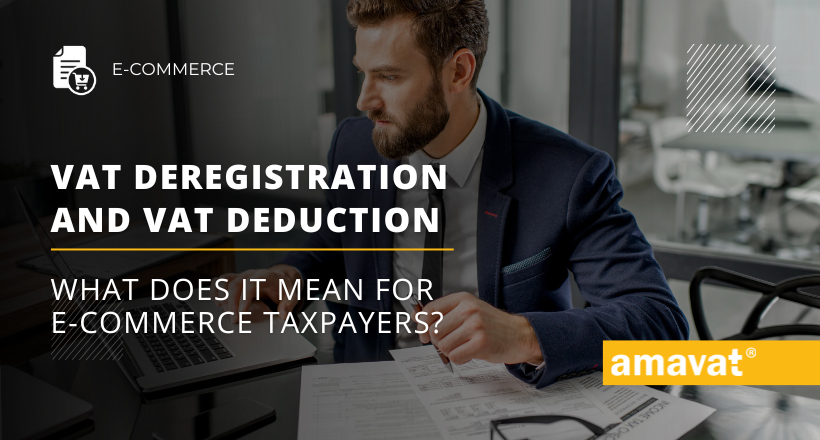VAT deregistration and VAT deduction: What does it mean for e-commerce taxpayers?
The Act of March 11, 2004, on Goods and Services Tax (VAT) provides for circumstances under which an active taxpayer may be deregistered and subsequently reinstated in the VAT register. What does this mean for e-commerce businesses, and can VAT deduction be applied in such cases, and under what conditions?
Let’s start by explaining these concepts, “VAT deregistration” and “VAT deduction,” which often appear in the tax realm and may seem quite complex. We will now try to clarify these issues in a manner understandable to everyone.
VAT deregistration – What is it about?
VAT deregistration is the process whereby a business is exempted from the obligation to pay VAT on its services or products. This may result from various reasons, for example, if the company engages in activities exempt from VAT or if turnover is so low that the entrepreneur is no longer subject to VAT registration requirements.
For the companies, this means that they are not required to add VAT to the prices of their goods or services. This can be advantageous, especially when the majority of customers are not entitled to VAT deduction (e.g., individual consumers).
VAT deduction – What is it?
On the other hand, VAT deduction is the right of the entrepreneur to deduct the amount of VAT paid on purchases made within the scope of their business activities. This means that the companies can reduce their VAT liability by paying only the difference between the VAT collected from customers and the VAT deducted from suppliers.
VAT deduction is particularly important for companies as it helps minimize tax burdens. Entrepreneurs can deduct VAT on purchases such as raw materials, services, or equipment, which helps maintain a balance between revenues and costs.
VAT deregistration – on request or ex officio
Active VAT taxpayers, including e-commerce entities, are obliged to submit a registration application before carrying out their first taxable transaction – through the VAT-R form, which serves as the basis for entry into the VAT register.
However, there are circumstances under which an entrepreneur may be deregistered from the VAT register. This occurs, among other reasons, as a result of a notification submitted by the taxpayer – using the VAT-Z form, of ceasing taxable activities (Art. 96, para. 6 of the VAT Act) – within 7 days from the date of ceasing taxable activities.
The head of the tax office may also deregister a taxpayer from the VAT register without their knowledge – after meeting the conditions specified in Art. 96, para. 9 of the VAT Act. Deregistration from the VAT register “ex officio” occurs when:
- the taxpayer no longer exists, or
- despite documented attempts, there is no possibility of contacting the taxpayer or their representative, or
- the data provided in the registration application turn out to be false, or
- the taxpayer or their representative fails to respond to requests from the tax authority, or
- the available information indicates that the taxpayer is engaged in activities intending to exploit banks within the meaning of Art. 119zg, para. 1 of the Tax Ordinance or Credit and Savings Cooperatives for purposes related to tax evasion;
- as a result, the court has ruled, based on separate provisions, to prohibit the taxpayer from conducting business activities.
Additionally, as indicated in Article 96 (9a) of the Value Added Tax Act, deletion from the VAT register also applies to a taxpayer who:
- Suspended business activities based on the provisions regarding the suspension of business activities for a period of at least 6 consecutive months, or
- Being obliged to submit VAT declarations, did not submit such declarations for 3 consecutive months or for a quarter, or
- Submitted VAT declarations for 6 consecutive months or 2 consecutive quarters in which no sales, acquisition of goods or services, or import of goods with amounts of deductible tax were shown, or
- Issued invoices or corrective invoices documenting transactions that were not carried out, or
- Conducting business activities, knew or had reasonable grounds to suspect that suppliers or acquirers indirectly or directly involved in the supply of the same goods or services participated in fraudulent tax settlements for financial gain – subject to Article 96 (9b-9f) of the VAT Act.
Cancellation from the VAT register does not affect the legal status of the entity as a VAT taxpayer. In accordance with Article 15 (1) of the VAT Act, “a taxpayer of VAT is an entity conducting business activities, i.e., a person carrying out economic activities on an ongoing basis.” The provision does not require registration as a prerequisite for recognizing a VAT taxpayer.
Restoring a taxpayer to the VAT register – principles
Article 96 (9h) of the VAT Act specifies that the head of the tax office, upon request of the taxpayer submitted within two months from the date of deletion from the register, restores the entity as a VAT taxpayer without the need to submit a registration report if the taxpayer proves that they are still conducting taxable activities and – no later than when submitting the application for restoration – submits the missing VAT declarations. Restoration to the VAT register is therefore done upon request and does not require re-registration through the VAT-R form.
Example: The taxpayer did not submit VAT declarations for three consecutive tax periods, although they were selling goods during this time. On February 21, the Head of the Tax Office deleted them from the VAT register. To be reinstated to the register, the taxpayer should submit an application to the Head of the Tax Office by April 21, along with the overdue declarations and payment of the overdue tax along with interest. They do not need to submit a VAT-R application for re-registration for VAT.
Cancellation from the VAT register and the right to deduct VAT
Despite cancellation from the VAT register, the entrepreneur still retains the status of a VAT taxpayer and must settle with the tax office for activities subject to tax. Article 86 (1) of the VAT Act states that to the extent that goods and services are used to perform taxable activities, the taxpayer is entitled to reduce the amount of tax due by the amount of tax charged. The right to deduct VAT arises for all taxpayers, provided that they demonstrate that purchases were related to taxable activities.
Therefore, actual activity rather than registration status is decisive. The material condition is crucial for maintaining the right to deduct input tax. However, it is necessary to distinguish between the moment when the right to deduct arises and the moment when it is exercised. To effectively realize the already accrued entitlement, the taxpayer must be registered in the VAT register.
Example: The entrepreneur did not submit VAT declarations for three consecutive tax periods but made purchases of goods for business activities during this time. On April 15, the Head of the Tax Office deleted them from the VAT register under Article 96 (9a) point 2 of the VAT Act. The taxpayer did not lose the right to deduct VAT. However, to exercise this deduction, they must fulfill formal obligations, i.e., submit an application for restoration to the VAT register and submit overdue declarations showing the amount of tax to be deducted.
Deletion versus VAT deduction – use professional VAT Compliance services

The circumstance of deletion from the VAT register does not deprive the taxpayer of rights or obligations if during the deletion period the taxpayer behaved as an entity conducting taxable business activities. However, the regulations concerning the deduction of VAT during the deletion from the VAT register can be complex depending on the specific situation of the taxpayer.
Whether in the case of registration, restoration after deletion from the VAT register, or deduction of VAT for this period and thereafter, it is worthwhile to take advantage of comprehensive VAT Compliance services, where we will handle your VAT tax filings.
For more information about VAT Compliance service, please visit here: https://amavat.eu/vat-compliance-e-commerce/
If you operate an e-commerce business and are looking for comprehensive and tailored VAT Compliance services, we invite you to contact our experts: contact – amavat®.
amavat® Team





